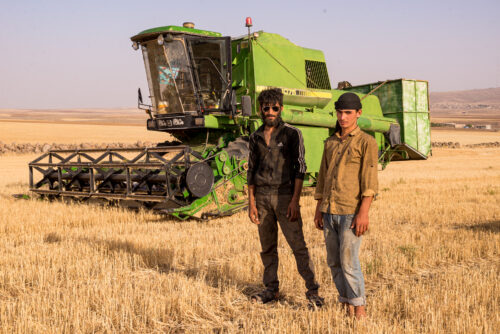Every Tuesday, a delivery of vegetables and fruits comes to the Internationalist Commune in Rojava. The friends bring us tomatoes, potatoes, apples, oranges, onions, cabbage, lettuce and much more, always depending on the season. Sometimes the vegetables are quite different from what I know from the European supermarkets in my home country. I have seen huge potatoes here, totally misshapen tomatoes and crooked cucumbers. Of course, this leads to questions. What happens to all the vegetables in my home country that deviate even a little from the required norm? Why do we always eat the same varieties? Wasn’t there once a diverse abundance of different potatoes in their continent of origin, South America? Don’t tomatoes also come from there? And pumpkin, tobacco and coffee and cocoa? What did my ancestors eat in Europe? How can it be that after 23 years I eat for the first time something that I planted myself and pulled out of the ground? How can it be that I have always eaten meat for years, but have never killed an animal myself that is bigger than a mouse? I have not even witnessed it. I haven’t witnessed a single harvest and never had to water plants to have something to eat. I have long felt very alienated from nature, from myself, especially when I think about it more deeply or work too long on the computer. I look around me and see a lot of things that feel wrong, especially in the cities of Europe. Things that shouldn’t exist like that. Not only from an ecological point of view, but also from a moral, ethical perspective. I get a little angry, a little sad, but most of all I feel resistance. I feel the irresistible will to change this reality.
This will has led me to Rojava.
Here I get to know completely different realities of life, with serious other problems. Ecology moves into the background. I slowly, slowly learn what war can mean. I see myself reflected in the imperialist powers and learn tenderness at the same time. The term “socialism” becomes more understandable and finally, little by little, women find a place in my view of history. I become more aware of the great material privileges based on colonialism, as well as the extreme ideological contradictions in my homeland. The urgency of democracy, the need for revolution, is clearer to me than ever. My willingness to do whatever it takes to make it happen is also greater than ever. What woke me up from my petite-bourgeois bubble was the feeling already described: the lack of connection to nature. The ecological perspective. And I won’t forget that. I’m convinced that many feel this way. That the origin of all ecological problems lies in hierarchical social structures with concrete ideologies, systems and power holders is clear. There is no such thing as green capitalism. The young generation is also beginning to understand this, with their demands for reform being dismissed by rigid regimes and hypocritical corporations with false promises and bogus solutions. Anything other than a profound social revolution will remain only “symptom control.” So, the social struggle is also the crucial one regarding global warming and should be the most urgent question of every environmental and climate activist.



But why, even in difficult times, do social movements and revolutions, like in Rojava, have to put great emphasis on the ecological challenges?
The ecological crisis, as well as the oppression of women, share the same origin: the emergence of the anti-democratic patriarchal society, consolidated in the first state system 5000 years ago. Until today, women usually have a stronger connection with nature. Women are the source of life and continue to carry the traits of communal life until today. It is no coincidence that we speak of “Mother Earth”. Abdullah Ocalan describes women as the first colonized group in humanity. So it is the domination of human over other humans that prepared the way for exploitation and chauvinism. On this basis, human’s relationship with nature also changed. While society was in symbiotic relationship with everything living in the universe for tens of thousands of years, with the rise of patriarchy, man’s arrogant domination over nature began. It resembles the son who wants to gain dominion over his mother. The struggle of women against patriarchal oppression throughout the history of civilization, is always to be understood as a struggle of natural society living in harmony with nature against exploitative capitalist modernity. It becomes clear that women’s liberation and an ecological society are not detached from each other. Accordingly, a social revolution that is not also an ecological one and is linked to the liberation of women cannot be sustainable. Abdullah Öcalan writes in Beyond State, Power and Violence:
“A social consciousness that lacks ecological consciousness will inevitably corrupt and disintegrate, as has been seen with real socialism. Ecological consciousness is a fundamentally ideological consciousness. It is like a bridge between philosophy and morality. A policy that promises salvation from the present crisis can lead to a proper social system only if it is ecological.”
A democratic society requires the power of self-defense, as well as self-sufficiency for each community. We can only live freely if we can feed ourselves. We must learn to live in such a way that we no longer depend on mineral resources, industry and imports. It is crucial to finally overcome the economic logic of capitalist modernity, which is focused on profit and perpetual growth. The key to this lies in our relationship with nature.
Local
In Rojava, most municipalities have a commission for ecology. Their task is, among other things, the decentralization of the food supply. Labor cooperatives are being formed to de-privatize field farming and processing. With the campaign “Make Rojava Green Again”, which was founded in 2018, we, the Internationalist Commune of Rojava, support the establishment of need-based communal gardens, especially also in neighborhoods on the roofs and courtyards. Trees are also planted and decentralized water and electricity systems are established. In this way, democratic confederalism is being built not only on a political, metaphysical level, but also very concretely its foundation with a practice aimed at complete self-sufficiency. Only through these changes can we destroy the great hierarchies and power relations of commodity traders and agribusiness corporations that determine the world’s livelihoods. Democracy without this is not possible. However, it is not just about building communal ecological economies, but more importantly about how we change in character. How does a free person think, how does a free person feel? How does a communally living person act and move? I know that we can learn a lot from nature. By working with the earth, with trees, wheat, and animals, we cleanse our minds and hearts of all the systemic diseases that have been forced upon us and that we ourselves embody. We find closer to our own nature by experiencing how alive everything around us is. Gardening collectively teaches us patience, creativity and self-discipline in equal measure. Our connection to the soil we stand on, from which we live, grows with each shrub we tend, and so does our willingness to defend it. We learn nowhere better to be humble. Ownership is questioned anew and the most complex problems are resolved through the simplicity of natural living.
Global
That the ecological struggle is a global one and must be led with an internationalist perspective by all of us is obvious. We all feel the alienation from nature. There is no struggle that can unite us more and more easily than the ecological one, and none that demands closer cooperation. All indigenous resistance groups know this, as do climate youth. Gaura Devi knew that, and Ocalan knows that. The climate issue is simple: we, as humanity, manage to reduce global greenhouse gases quickly enough or the climate will heat up inexorably. We fight for a green future now or we have none. This simple fact jolted even me out of my reality-deprived, petite-bourgeois existence. The first effects of global warming are being felt by people in the global south, who are already suffering greatly from capitalist exploitation anyway. The water table here in Rojava, for example, is dropping every year and the soil is becoming drier and more fragile. In search of the origins of the problem, an entire generation is looking from the northern hemisphere to the global south. Their slogans around “climate justice” mean anti-colonialist struggle. The Youth needs to become more radicalized. Revolution has broken out on the periphery of the existing system, while on the streets, in the centers of capitalist modernity, incredible youth pressure must emerge. This is their role and responsibility. “Make Rojava Green Again” is, of course, also conducted in an internationalist context. The goal of the campaign is to be an example to all ecological movements in the world with the revolutionary practice in Rojava and to offer them a common point of reference. Through the work with the campaign and with the offer to travel to Rojava within its framework, concrete possibilities for the exchange of experiences should be given. This is essential for the global networking of our struggles as well as for the defense of Rojava!
This text was published as an article in the Lêgerîn-magazine nº 07
Have a look here:
